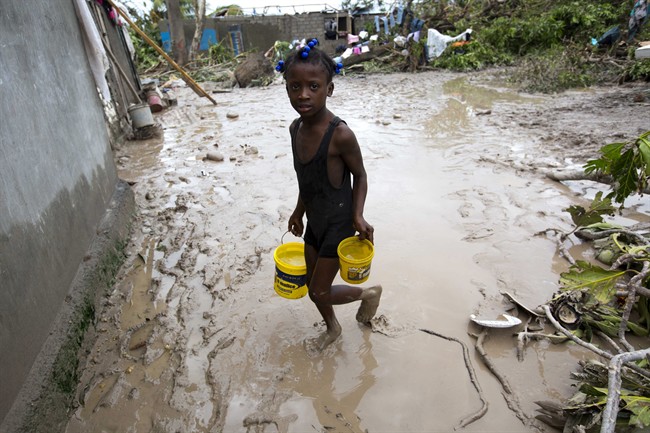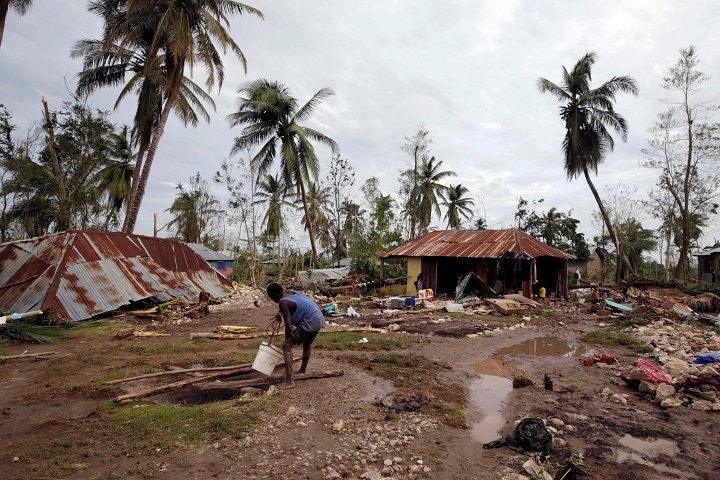With more than 800 people dead, and an estimated 350,000 in need of help, aid groups are beginning to deploy humanitarian response to Haitians affected by Hurricane Matthew. However experts warn that a history of distrust towards international aid groups in the country could impact relief efforts.

READ MORE: Hurricane Matthew death toll rises to 842 in Haiti
“The failed reconstruction of Haiti after the 2010 earthquake really pulled back the curtain on how a patchwork of NGOs, international institutions and donor countries (often with good intentions) cannot replace or act as a substitute for a strong government and domestic institutions,” said Kevin Edmonds, instructor with the Caribbean Studies Department at the University of Toronto and member of the Caribbean Solidarity Network.
Many Haitian communities have yet to recover from the devastating 2010 earthquake that killed hundreds of thousands and left more than 1.5 million people displaced.
And while Haiti received billions in earthquake aid, multiple reports point to a lack of progress in the country’s reconstruction.
In 2015, five years after the earthquake struck, NBC reported 85,000 people were still living in displacement camps and deplorable conditions. According to the report, 95 per cent of the 1.5 million people who were living in camps had been moved into temporary slums where there was no running water, electricity of sanitation.
WATCH: Haiti left devastated by Hurricane Matthew

“Haiti is in the situation it is now largely due to the fact that the Haitian state and its capacity has been effectively undermined by repeated aid embargoes, a legacy of foreign political intervention and brutal conditions on loans which have eroded Haiti’s economy and its corresponding ability to provide the most basic of social services,” Edmonds said.
READ MORE: Haitians gather on 6th anniversary of devastating earthquake
Edmonds noted that the Haitian people were shaken by a lack of accountability from the UN for their role in the cholera outbreak that followed the earthquake. The outbreak killed roughly 10,000 people.
The disease – which causes people to die from dehydration due to vomiting and diarrhea – was introduced into the country’s biggest river from a UN base where Nepalese peacekeepers were deployed. In August of this year, the UN admitted their role in introducing cholera.
The Red Cross has also come under fire for a lack of accountability. According to a ProPublica report released in 2015, several reconstruction and housing projects fell though due to “land disputes” and a plan to help save Haitians from cholera fell through due to “internal issues.”
READ MORE: American Red Cross accused of wasting Haiti earthquake relief
WATCH: ‘Pray for us!’: Haiti residents capture video of Hurricane Matthew’s power

“The Haitian people have seen a lack of accountability from the international NGOs which used the earthquake to cash in on the humanitarian crisis without providing any transparency to how billions of dollars were spent,” said Edmonds.
“There are hundreds of horrific examples like the one where the Red Cross spent $500,000,000 on the construction of six permanent houses.”
The American Red Cross has contested these claims, saying the organization has “made a difference in the lives of millions of Haitians” since the earthquake hit.
A volatile political landscape has also contributed to problems in the Western Hemisphere’s poorest country.
Former Haitian president Michel Martelly’s government had a problematic record of human rights abuses and corruption. According to a U.S.-commissioned human rights report, human rights issues ranged from unlawful killings by government officials, an inconsistent judicial system and rampant violence against women.
Martelly’s term ended in February, but elections have been delayed due to violent protests and allegations of voter fraud.
A fourth chance for an election was scheduled for Sunday – but thanks to Matthew’s arrival, it has been delayed indefinitely.
“We have seen that when the Haitian people are allowed to exercise their democratic rights (without interference), they have chosen political leaders which look to build up the institutions, capacity and social services of the Haitian state,” Edmonds said.
- Trudeau says ‘good luck’ to Saskatchewan premier in carbon price spat
- Canadians more likely to eat food past best-before date. What are the risks?
- Hundreds mourn 16-year-old Halifax homicide victim: ‘The youth are feeling it’
- Vacation death: Cuba apologizes after Canadian family receives wrong remains
Edmonds worries that a lack of progress in Haiti may lead to “donor fatigue” from both citizens and NGOs that could impact Hurricane Matthew relief efforts.
However, he credits the Haitian people and grassroots organizations for trying to bring change to the struggling nation. But Edmonds said governments and international organizations need to work together to create better opportunities in Haiti.
READ MORE: Five years later, aid workers admit slow recovery from Haiti earthquake
“The most recent disaster in Haiti has once again exposed the man-made disasters of poverty, inequality, exclusion and exploitation which plague Haiti,” he said.
“What is needed is an approach based on solidarity, not charity.”

Here’s what is being done differently this time
Grassroots organization Plan Canada has been working with the Haitian community to help open schools and provide children with medical care.
Tanjina Mirza, chief programs officer at Plan Canada, admitted that while there were problems with emergency response in 2010, teams on the ground have not felt a sense of distrust among Haitians.
“We are a long-term development agency – we have been working there since 1973 and we will be there for decades to come,” Mirza told Global News, adding that the Haitian government showed better preparedness this time around.
According to Mirza, Plan Canada’s initial focus on the relief effort in Haiti will go into buying more survival kits which will help with water purification and hygiene. The agency is also stockpiling mattresses for those who are displaced.
The Canadian government has already deployed a team to Haiti to assess the damage caused by Hurricane Matthew and has set aside $3 million for immediate assistance.
Edmonds noted that a new initiative has popped up on Facebook that aims to provide information about groups, organizations and programs that have first-hand resources on the ground in Haiti to make sure things get done. The group is organized by Haitians and those have spent years working in Haiti.
“Those of us with long experience in Haiti want to ensure assistance is getting where it is needed,” organizers wrote on Facebook.
“Each of these organisations is based or established in the affected communities and on the ground right now providing critical support. 100% of funds donated will go to people affected by the Hurricane.”
— With files from The Associated Press




Comments